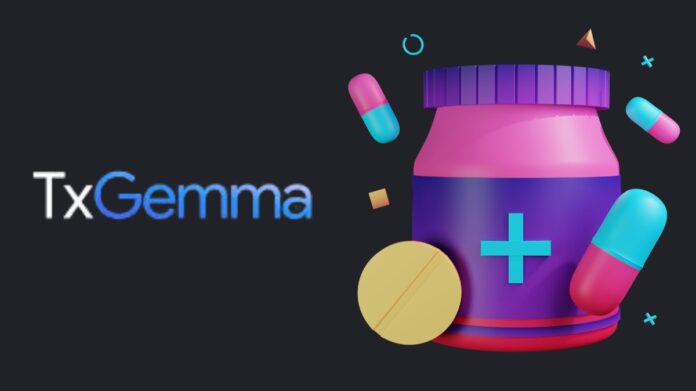Presenting TxGemma: Open models to enhance the development of treatments
The process of creating a novel treatment is dangerous, infamously slow, and expensive it can cost billions of dollars. 90% of potential medications don’t make it past phase 1 testing. Google presents TxGemma, a set of open models created to harness the potential of large language models to increase the effectiveness of therapeutic development.
TxGemma is specifically trained to comprehend and predict the properties of therapeutic entities throughout the entire discovery process, from identifying promising targets to assisting in the prediction of clinical trial outcomes. It builds upon Google DeepMind’s Gemma, a family of lightweight, cutting-edge open models. This has the potential to lower the expenses related to conventional procedures and shorten the time from lab to bedside.
From Tx-LLM to TxGemma
Google unveiled Tx-LLM, a language model trained for a range of therapeutic tasks associated with drug development, last October. It has created TxGemma, its open successor at a practical scale, in response to the overwhelming demand for using and refining this model for therapeutic applications. Google is making it available today for developers to customise to their therapeutic data and tasks.
TxGemma models are open models intended for prediction and conversational therapeutic data analysis. They were refined from Gemma 2 utilising 7 million training examples. There are three sizes available for these models: 2B, 9B, and 27B. Every size has a “predict” version designed especially for specific tasks taken from Therapeutic Data Commons, including determining whether a compound is harmful.
These duties include:
- Categorization (can this chemical pass through the blood-brain barrier, for example?)
- Regression (for example, forecasting a drug’s binding affinity)
- And generation (for example, producing the reactant set given the reaction’s product).
Strong performance is provided using the largest TxGemma model (27B predict version). In addition to outperforming or almost matching its prior state-of-the-art generalist model (Tx-LLM) on nearly all tasks, it also competes with or outperforms a large number of models that are especially made for a single task. In particular, on 64 of 66 tasks, it beats Google’s prior model or performs similarly to it, and on 50 of the tasks, it beats specialised models.
Deeper insights using conversational AI
Additionally, TxGemma offers “chat” versions 9B and 27B. These models can explain their reasoning, respond to intricate queries, and participate in multi-turn debates since general instruction tuning data has been incorporated to their training. For instance, depending on the structure of the molecule, a researcher may ask TxGemma-Chat why it thought a certain chemical would be harmful and get an explanation. Compared to TxGemma-Predict, this conversational capability comes at a minor expense to the therapeutic activities’ raw performance.
Increasing TxGemma’s functionality via optimizing
A fine-tuning sample Colab notebook that shows developers how to customise TxGemma to their own treatment data and duties is included in the version. This notebook demonstrates how to optimise TxGemma for clinical trial adverse event prediction using the TrialBench dataset. By fine-tuning, researchers can use their private data to build models that are specific to their own research requirements. This could result in even more precise predictions that aid researchers in determining the potential safety or efficacy of a new therapy.
Using Agentic-Tx to coordinate processes for improved therapeutic discovery
TxGemma may be included into agentic systems to address more challenging research issues than single-step forecasts. Tasks involving multi-step thinking or current external knowledge are frequently difficult for standard language models to handle. To solve this, Google has created Agentic-Tx, a therapeutics-focused agentic system driven by Gemini 2.0 Pro. Agentic-Tx has eighteen tools, such as:
- Using TxGemma as a multi-step reasoning tool
- Web, Wikipedia, and PubMed general search tools
- Particular molecular instruments
- Tools for genes and proteins
On reasoning-intensive chemistry and biology tasks, Agentic-Tx delivers state-of-the-art scores from benchmarks like ChemBench and Humanity’s Last Exam. In order to show how Agentic-Tx can be used to plan intricate workflows and provide answers to multi-step research questions, Google is included a Colab notebook with its release.
Start using TxGemma
TxGemma is currently available on Hugging Face and Vertex AI Model Garden. Google invites us to experiment with the models, test the agent Colab notebooks, inference, and fine-tuning, and provide comments! TxGemma is an open model that can be further enhanced by researchers using their data for certain use-cases in therapeutic development.


